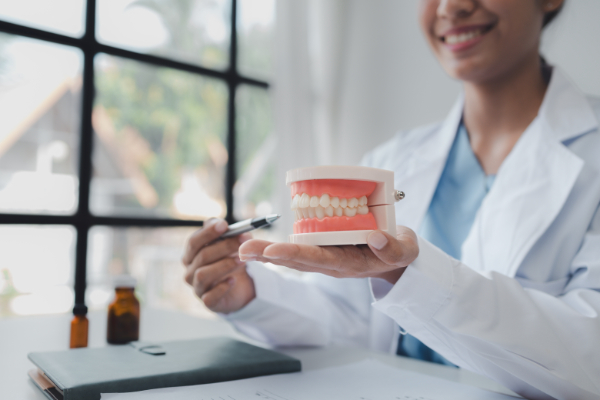How a Dentist Can Help With Dental Anxiety

If you get nervous going to the dentist, you are not alone. Dental anxiety is a common problem that almost everyone struggles with from time to time. Most people experience it before and during a procedure or appointment. While it may seem difficult to overcome, it is possible with the help of an experienced dentist. Do not let dental anxiety keep you from getting the dental care you need. Continue reading to find out more.
Four ways that a dentist can help relieve dental anxiety
Dentists want to help their patients feel comfortable in the dentist's chair. Therefore, dental professionals are always looking for ways to make going to the dentist easier. However, they know that putting off regular dental care can lead to big oral health problems later. Outlined below are four ways a dentist can help patients with dental anxiety. Review this information when preparing for an appointment or procedure.
Explanations and guidance
One of the most common ways a dentist will try to help with dental anxiety is by providing guidance throughout the process in a way the patient can easily understand. Step-by-step guidance can help familiarize the patients with certain procedures that may be unknown to them. Breaking down a process and explaining each step as they get to it can help ease nerves. Having the dentist or dental assistant guide the patient through each step can help relieve dental anxiety, as much of it stems from fear of the unknown.
Additionally, the dentist can provide thorough explanations as to what the procedure may entail beforehand. Descriptions in simple language allow the patient to have a better understanding of what is going to happen. That way, the patient is informed. Informed patients not only make better decisions about their health but also tend to be at greater ease during procedures. This better understanding can help ease nerves and reduce dental anxiety that comes from not knowing what to expect or not understanding the procedure.
Breaks
A simple but effective way that a dentist can help with dental anxiety is by having the patient take breaks during treatment. Certain dental procedures and even routine appointments can be hard on the patient, especially when they struggle with anxiety. Taking short breaks every few minutes allows the patient to take a deep breath and relax momentarily. Pauses in treatment also enable the dentist to ask the patient if they are feeling okay and if there is anything that would help them feel more comfortable.
Distractions
Distractions are ideal for reducing dental anxiety. Many dental offices are equipped with televisions to allow the patient to focus on something else during the appointment. It may also be suggested that the patient bring headphones to listen to music or podcasts throughout the appointment. By listening to something they enjoy, the patient can take their mind off their surroundings. Additionally, music helps block out the unfamiliar sounds that may come from dental instruments. Audiobooks are another great suggestion. Many patients find that the appointment time passes quickly with distractions like these.
Sedatives
If dental anxiety is severe enough, there is another option. Dentists can sometimes administer a sedative to help with dental anxiety. Sedatives used in dentistry come in many forms and can range from mild to deep. Of course, more advanced procedures will automatically involve the use of a sedative. However, for minor procedures or appointments, such as cleanings or filling placement, a low-level sedative, such as nitrous oxide, may be offered to reduce feelings of anxiousness.
When sedatives are used, there is usually a good deal of discussion beforehand. First, the dentist will want to look at the patient's medical history to make sure they are not allergic to any medication. Also, the patient will need to make the dentist aware of their medications or health conditions. Then the practitioner will explain the different sedation options and how the patient needs to prepare for each. Some sedation will require the patient to arrange a ride home after the procedure. However, milder and more temporary sedation, such as nitrous oxide, wears off immediately.
Find out more from a dentist
When struggling with dental anxiety, it is important to know that working with a dentist can be helpful. Dentists are trained to perform the necessary oral care and ensure that it is carried out smoothly, which means helping with dental anxiety. Reach out today to learn more about dental anxiety and what a dentist can do, or schedule a consultation visit!
Request an appointment here: https://hemetdentalcenter.com or call Hemet Dental Center: Brian Stiewel DDS, INC. at (951) 707-4366 for an appointment in our Hemet office.
Check out what others are saying about our dental services on Yelp: Dental Anxiety in Hemet, CA.
Recent Posts
For many people, dental anxiety is a significant barrier to getting the care they need, leading to more serious oral health issues. This fear or stress around dental visits can range from mild nervousness to intense apprehension, making it hard to schedule an appointment. However, understanding dental anxiety and learning how to manage it can…
Dental anxiety is a common issue that affects people of all ages. This term refers to the fear, anxiety, or stress of dental visits. There are several misconceptions about dental anxiety, leading to additional fear or avoidance of necessary dental care. By separating facts from fiction, patients can better understand this condition and go to…
Dental anxiety affects millions of people in the U.S. This anxiety can often prevent patients from getting treatments that can keep oral diseases like tooth decay and gum disease away or prevents them from getting worse. Dental phobias can be the result of previous bad experiences with dentists, or they can be caused by a…
The fear of the dentist, often known as dental anxiety, is the leading cause of untreated tooth problems, among other things. The following are a few questions that you can ask your dentist regarding dental anxiety. Perhaps the answers will help you join the group of patients who do not mind going to the dentist.Dental…


